July updates: Ellen and Linn's secondment at Cotswold Seeds, and LegumeLegacy and LegacyNet at the Open Farm Day in Quebec
July updates: Ellen and Linn's secondment at Cotswold Seeds, and LegumeLegacy and LegacyNet at the Open Farm Day in Quebec
Hi there!
From mid-June to mid-July, it was Linn and Ellen’s turn to go on their first secondment. They were given the opportunity to spend four weeks at Cotswold Seeds, one of LegumeLegacy's partners, where they explored the industrial side of agriculture and gained invaluable insights. Let’s read about their adventures in the UK!
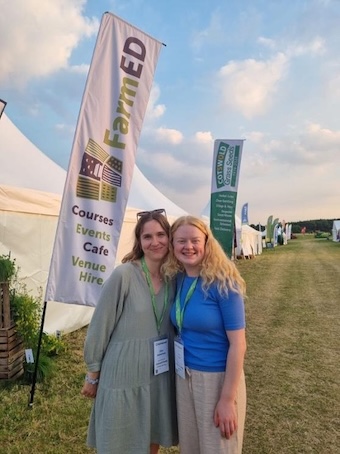
Ellen (left) and Linn (right) at Groundswell festival, UK.
In mid-June, we travelled to the Cotswolds in the UK by train from Belgium and Switzerland to go on our first secondment. We spent two weeks each at Cotswold Seeds (Moreton-in-Marsh) and two weeks at FarmED (Shipton-under-Wychwood). Cotswold Seeds is a seed company providing tailored seed mixtures to farmers for grasslands and herbal leys. FarmED is a non-profit organisation connecting farmers, industry and the public through offering educational courses, farm walks, and conference opportunities. They aim to inspire, educate and connect people to build sustainable farming and food systems based on regenerative agriculture. A major part of regenerative agriculture is herbal leys, and at the farm they exhibit herbal leys in crop rotations, planted and tailored with seeds from Cotswold Seeds. Linn started her first two weeks of the secondment at FarmED, while Ellen started her first two weeks at Cotswold Seeds. After this we swapped places.
At Cotswold Seeds, we were given a tour around the company building by Paul Totterdell, Group Operating Director of Cotswold Seeds. He explained how their company worked - from the big batches of seeds and the long lists of bespoke seed mixtures, and how this comes together into pallet-high mixes sent out to farmers all over the UK. It was interesting to see that a ‘relatively small’ business - in terms of numbers of staff members and the size of the building - offers such specialised and tailored advice to many farmers across the UK. One of our tasks at Cotswold Seeds was to write an article for their website on a topic of our interest. Linn wrote an article on ploidy in plants in agriculture, and Ellen wrote about mycorrhizal fungi - you can read our articles here:
Linn: https://www.cotswoldseeds.com/articles/830/diploids-and-tetraploids-in-grassland-ley
This was an excellent exercise for us to practise building a bridge between academia and the general public, and particularly the farmers. As scientists, we are strongly focused on academic terminology and gaining new knowledge, which is necessary in order to guarantee scientific quality of research. At the same time, it is equally important to bridge academia and the general public and share knowledge with everyone in a language they speak.
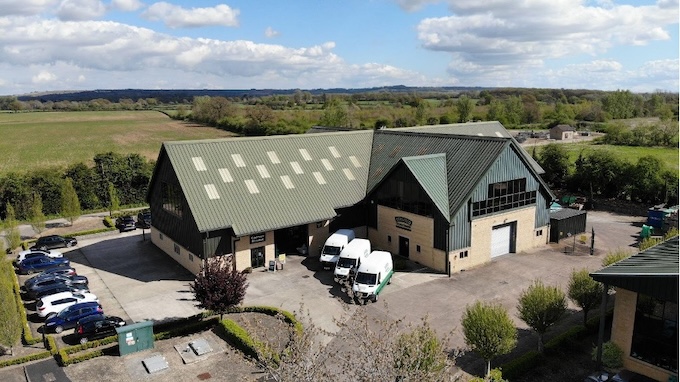
Cotswold Seeds warehouse and office in Moreton-in-Marsh, UK.
During the second week of our secondment, we had the opportunity to attend Groundswell Festival: a two-day agricultural festival in North Hertfordshire which focuses on regenerative agriculture, a way of farming that is focused on soil health, and improves biodiversity, crop yields, and ecosystem services. Many interesting talks were given and we were almost constantly running from one talk to another. We got immersed in regenerative agriculture and enjoyed the festival vibe with cloudless skies and temperatures of 25+ degrees. The talks that particularly stood out for us were:
- “Soil Carbon Sequestration: What? How? Why?” by Joel Williams (Ellen). In my PhD, I will look at soil organic matter mineralisation. As a result, I was interested in this talk, and Joel Williams very clearly explained the basis of soil carbon sequestration.
- “Adjusting nitrogen management to regenerative soil health and crop performance” by John Kempf (Ellen and Linn). We were very surprised to learn that plants not only take up nutrients from the soil in the form of dissolved inorganic nutrients but that they also take up nutrients through a process called “rhizophagy cycle”. In this process, free-living microbes acquire nutrients in the soil, and are taken up by plants, which extract the nutrients from the microbes. Then, the microbes enter the soil again, and the process repeats itself.
- “Soil profiles and dynamics: Soil characteristics” by Odette Menard (Linn). This presentation showed how to analyse the soil on the farm with simple tools, and Menard showed photos of how different depleted and healthy soils are.
- The demonstrations of “Truffle hunting” (Ellen and Linn) and “No-till potatoes”! (Linn) We followed two Cocker Spaniels hunting for truffles in the forest! And Linn watched a demonstration on how potatoes can be grown on top of the soil, covered by hay.
If you are interested in or working on regenerative agriculture, we strongly recommend joining Groundswell festival if you have the opportunity.
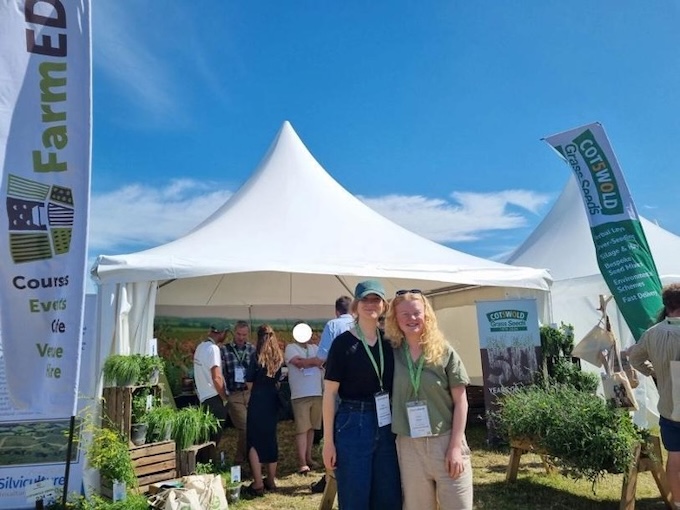
Ellen (left) and Linn (right) at the Cotswold Seeds and FarmED stand at Groundswell.

Ellen (left) and Linn (right) at Groundswell.
During one of the weekends, we met up with Raniel - one of our colleagues, a Doctoral Researcher based in Reading. We went on a day trip to Oxford and had a very pleasant day. We visited the Ashmolean Museum, had a lovely lunch and strolled around the city, visiting markets.
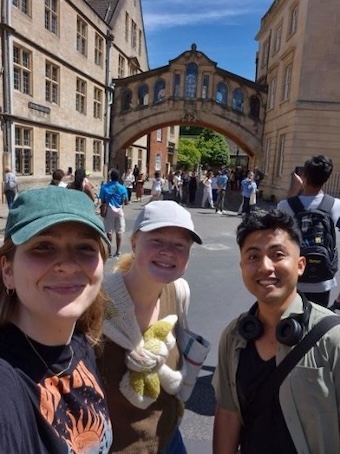
Ellen (left), Linn (middle) and Raniel (right) in front of the Bridge of Sighs - a city landmark of Oxford.
At FarmED, the workdays were highly different to our regular office based jobs. During the first two weeks of our stay in England we had almost exclusively warm and sunny days (or is this just how we remember it in retrospect?), making Linn's first experience of outdoor life on a farm very enjoyable. We both took part in several farm walks about crop rotations, herbal leys and the effect of artificial nitrogen fertilisers, we learned about beekeeping and how to grow and tend to vegetables in a kitchen garden covering 2 hectares. The food in the cafe was mainly made from what was harvested in the kitchen garden, and we enjoyed lunches cooked by the kitchen team. Further, we got to listen in to interesting talks by neighbouring farmers and join courses on Wildflowers, Regenerative Agriculture and Herbal Leys. The main take away from FarmED and the team there is that it all starts with the soil! Farming for crops also includes caring for the soil. Linn’s absolute favourite experience was to help herd sheep across the farm, and to chase the escaping hens. She received help from a local fox, which unfortunately took a high payment for his service…
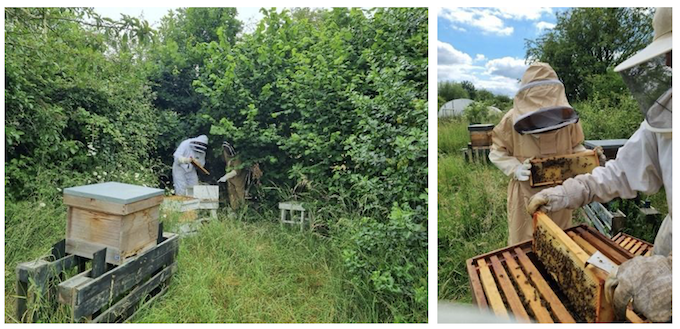
Ellen and Paul tending to bees, Linn and Tony Yarrow inspecting beehives.
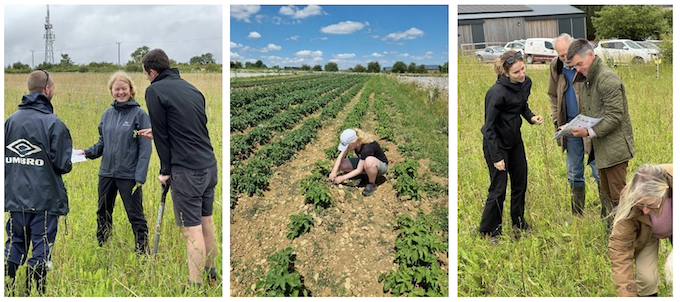
Inspecting herbal leys and weeding potatoes.
Other experiences from staying in the UK for four weeks included cycling around on the left side of the road and never knowing which way to look for cars. We enjoyed a sunnier England than expected, however, we did get some rain on the final days. We also had several opportunities to watch England win multiple times in the Euros at pubs in the Cotswolds!
To wrap up, we would like to thank Paul (Group Operating Director of Cotswold Seeds), Sally (Operations Manager at FarmED) and James (Systems and Project Manager at Cotswold Seeds) for taking care of us, and all the staff members of Cotswold Seeds and FarmED to make us feel warmly welcome throughout our stay. Thank you!
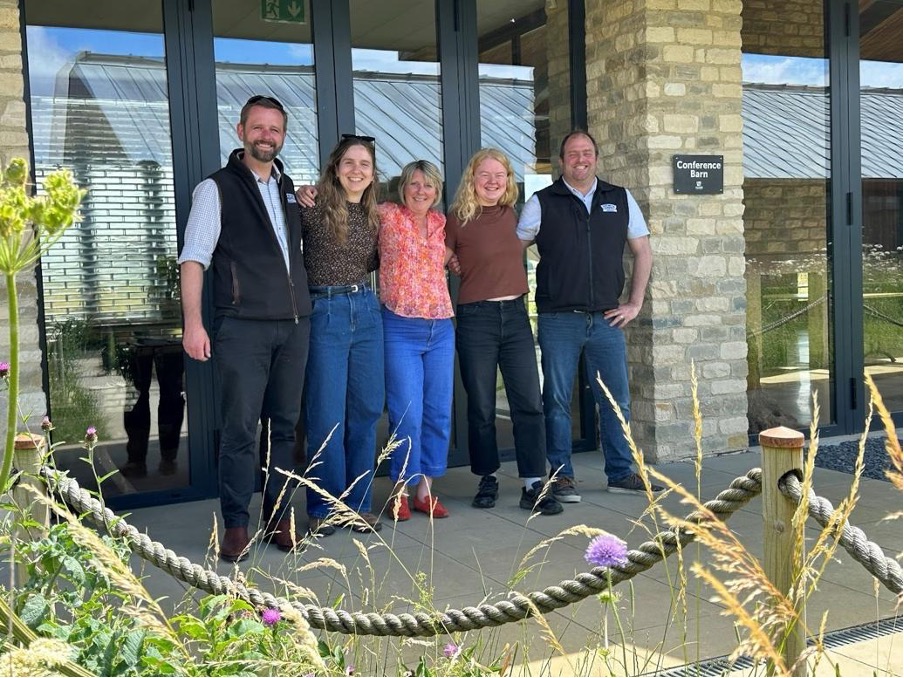
Group picture in front of FarmED, from left: Paul Totterdell, Ellen, Sally Pullen, Linn, and James Livingstone.
"Ellen and Lin's secondment at Cotswold Seeds" was written by Ellen Baekelmans and Linn Huser, and edited by Ellen Baekelmans, Die Hu, Linn Huser and Sophia Philadelphi.
While Ellen and Linn were on their secondment, Dr. Marie-Noëlle Thivierge, one of the Principal Investigators on the project at Agriculture and Agri-Food Canada presented at an Open Farm Day.
Results from LegumeLegacy and LegacyNet presented at an Open Farm Day in Quebec, CanadaOn July 17, a joint Open Farm Day was organized by Agriculture and Agri-Food Canada and Université Laval at their research farm in Saint-Augustin-de-Desmaures, Quebec, Canada. Nearly 70 participants, mainly research students, research assistants, scientists and professors, as well as agronomists, attended the event. Eleven projects were presented, covering various crops (soybean, barley, quinoa, sunflower and several perennial forage species), technologies (drone- based phenotyping, breeding), and cropping practices (crop rotations, manure fertilization, cover cropping). This was an excellent opportunity to present the preliminary results of the grassland phase of the four Canadian sites of the LegacyNet and LegumeLegacy projects, funded locally by the Living Lab Quebec Racines d’avenir led by Union des producteurs agricoles, and at the international level by the European Union. Participants were impressed by the good performance of 4- and 6-species mixtures at all four sites. The use of ribwort plantain and chicory aroused much curiosity, as these herb species are rarely grown in Quebec. Most species in the forage mixtures had just reached their flowering stage and were at the apogee of their beauty during this demonstration day.
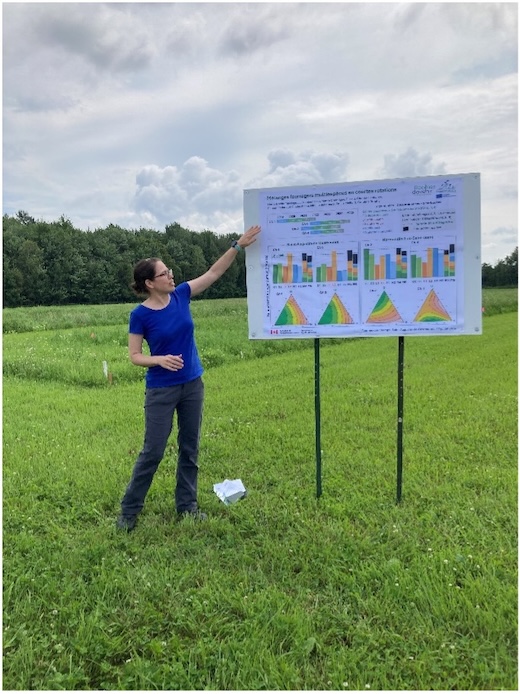
Dr. Marie-Noëlle Thivierge presents preliminary results from the four Canadian sites of LegacyNet and LegumeLegacy at the open farm day in Saint-Augustin-de-Desmaures (Quebec, Canada), on 17 July 2024. Photo: Mireille Thériault @ AAFC, 2024.
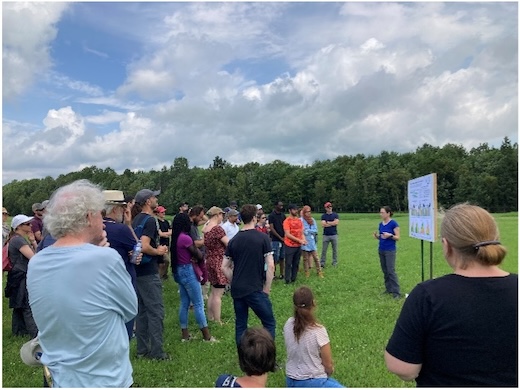
Nearly 70 participants were present at the open farm day in Saint-Augustin-de-Desmaures (Quebec, Canada), on 17 July 2024, where preliminary results from the four Canadian sites of LegacyNet and LegumeLegacy were presented by Dr. Marie-Noëlle Thivierge. Photo: Mireille Thériault @ AAFC, 2024.
"LegumeLegacy and LegacyNet at the Open Farm Day in Quebec" was written by Dr. Marie-Noëlle Thivierge.